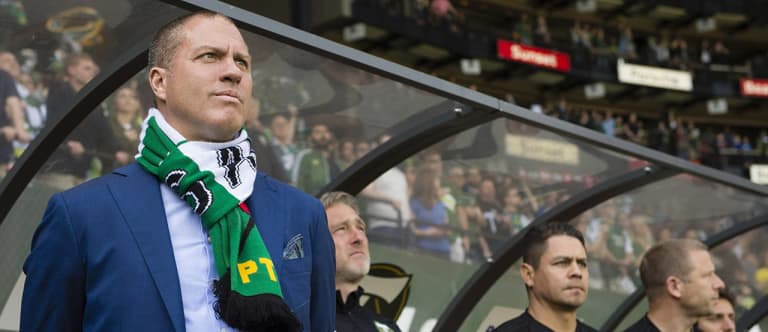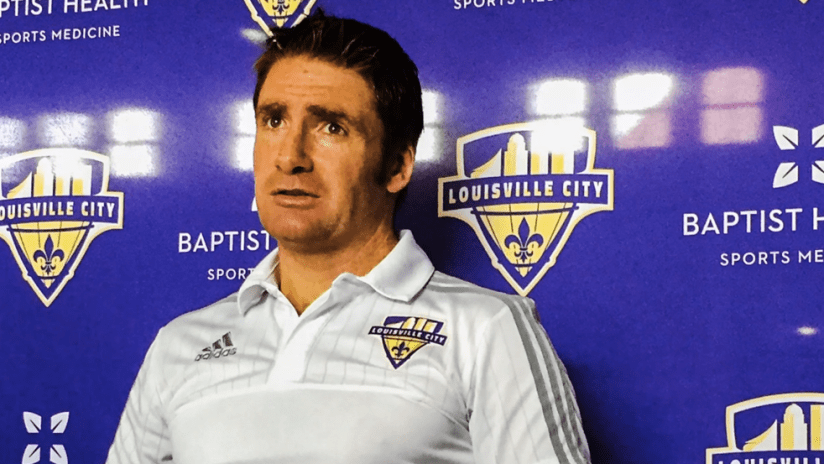Orlando City SC have found their new coach, hiring erstwhile/former Louisville City FC head coach James O'Connor.
Four things to know about his move to Orlando:
1. He coaches attacking soccer
The numbers speak for themselves regarding O’Connor’s tenure in Louisville. Louisville finished 1st in USL in goals scored in 2015, tied for 2nd in 2016 and 2nd in 2017. And they weren’t throwing caution to the wind at the expense of defending; they also finished near the top of the league in goal differential all three years.
Conor Shanosky, a former D.C. United defender and member of O’Connor’s Louisville’s 2015 and 2016 teams, describes O’Connor as a coach who is “tactically very adamant about having the ball and playing quickly, and likes to press up high.”
I had the opportunity to experience all of this first hand when I played against Louisville in 2016 as a member of the Harrisburg City Islanders. The first 10 minutes of the game felt like we got hit by a tidal wave. Every time we got on the ball, a Louisville player pressed us immediately; every time we tried to play out of the back, Louisville shifted up and across the field perfectly. We couldn’t find any gaps or space to play. I remember thinking, “Holy *&%^, this team is unreal.” I had played a lot of games and teams in my career, but that was a unique experience. I don’t remember many teams being as well trained and intense as that Louisville team.
2. He doesn’t need huge resources to win
Of the clubs I had face that were as dominant at their level as Louisville, none did it within the same financial restraints as Louisville. Louisville isn’t one of the biggest spenders in USL; O’Connor couldn’t just go out and sign the best players. He had to find ways to maximize his options. As Shanosky noticed of O’Connor, “he both recruits well and gets the best out of his players.
Per my colleague Matt Doyle:
“Orlando City’s outlay on transfers has been fairly robust over the past four years, but they’re very much in a 'win with this or goodbye' phase of building the roster. They’ve spent a ton of allocation money within MLS, and they brought in a pricey young DP, and my best guess is O’Connor didn’t pitch himself as the guy to build the roster, but the guy who can make the roster they already have on hand actually win games. That is a meaningful distinction and if I was the OCSC front office, I would only have hired a head coach who planned to do the second thing.
And the thing is I think he can. I think a good coach would look at that roster and say, 'Well, we’re gonna have to win some 3-2 games, but we’ve sure got the pieces to do that.'
Which is to say: He’s not likely to have much of a transfer budget at the outset. But if he does his job right, he won’t really need it. He’s just got to make sure the vets start playing at their peak levels, and that the young guys on the team – and by the way, this roster has way more young talent than folks seem to realize – actually improve.”
I wrote two weeks ago about the specific tactical adjustments I think the new coach should make to get the most out of the roster.
3. He has OCSC roots.
O’Connor played for Orlando City from 2012 to 2014 while the club was in USL. In 2013 and 2014, O’Connor was a player-coach for the team. When Orlando entered MLS in 2015, they partnered with Louisville as their USL affiliate.
4. There’s recent precedent for managers making the jump from lower divisions.

Gio Savarese made the jump from a lower division to MLS prior to the 2018 season | USA Today Sports Images
This is the second time in 2018 that a lower-division head coach has stepped up to MLS. Gio Savarese left the New York Cosmos during the winter to join the Portland Timbers. The Timbers got off to a slow start but are in the midst of a nine-game unbeaten run, including a six-game win streak.
To provide some personal insight on the USL to MLS gap — one of the major differences between MLS and USL is the level of personalities (that is to say, egos). Most of the players in USL are just getting their professional start or have been humbled in moving to a lower division. O’Connor didn’t have big names on his Louisville roster. That will change when he takes over Orlando. He will have some bona fide stars worth millions. Stars see the world — and themselves — differently than players happy to have a job.
It makes for one difference between O’Connor’s path and Saverese’s. Savarese coached former Real Madrid captain Raul and former Spain international Marcos Senna. He had the previous experience in managing big names. It’s not to say O’Connor didn’t manage personalities while in Louisville, but it’s a difference O’Connor will have to be aware of as he makes his next step. The tactics remain largely the same between levels, but the egos generally do not.













